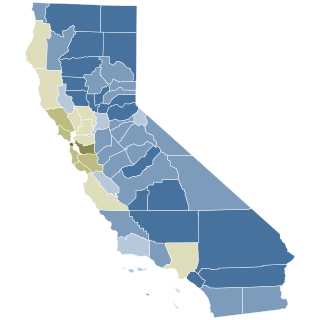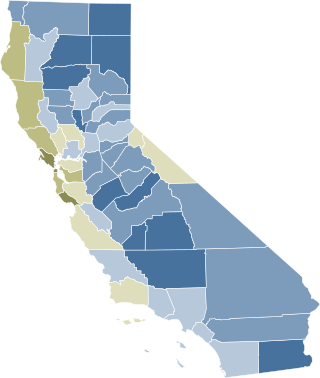
The 2003 California gubernatorial recall election was a special election permitted under California state law. It resulted in voters replacing incumbent Democratic Governor Gray Davis with Arnold Schwarzenegger, a Republican. The recall effort spanned the latter half of 2003. Seven of the nine previous governors, including Davis, had faced unsuccessful recall attempts.

Proposition 22 was a law enacted by California voters in March 2000 stating that marriage was between one man and one woman. In November 2008, Proposition 8 was also passed by voters, again only allowing marriage between one man and one woman. The Act was proposed by means of the initiative process. It was authored by state Senator William "Pete" Knight and is known informally as the Knight initiative. Voters adopted the measure on March 7, 2000, with 61% in favor to 39% against. The margin of victory surprised many, since a Field Poll immediately prior to the election estimated support at 53%, with 40% against and 7% undecided.
Felony petty theft is the colloquial term for a statute in the California Penal Code that makes it possible for a person who commits the crime of petty theft to be charged with a felony rather than a misdemeanor if the accused had previously been convicted of a theft-related crime at any time in the past. The technical name for the charge is petty theft with a prior.

Proposition 209 is a California ballot proposition which, upon approval in November 1996, amended the state constitution to prohibit state governmental institutions from considering race, sex, or ethnicity, specifically in the areas of public employment, public contracting, and public education. Modeled on the Civil Rights Act of 1964, the California Civil Rights Initiative was authored by two California academics, Glynn Custred and Tom Wood. It was the first electoral test of affirmative action policies in North America. It passed with 55% in favor to 45% opposed, thereby banning affirmative action in the state's public sector.

Proposition 65 was a California ballot proposition on the November 2, 2004 ballot. It failed to pass with 3,901,748 (37.6%) votes in favor and 6,471,506 (62.4%) against. It was a state constitutional amendment that would have required voter approval for any state legislation reducing certain local government revenues from January 2003 levels. It was officially known as the Local Taxpayers and Public Safety Protection Act.

Proposition 74 (2005) was a ballot proposition in the 2005 California special election that intended to extend probationary periods for the state's public school teachers from two years to five before attaining tenure. It failed at the polls, with 55% of voters rejecting it.

.

Proposition 2 was a referendum for a state constitutional amendment placed on the ballot by the Texas legislature and approved by the voters at the November 8, 2005 general election. The measure added a new provision to the Texas Constitution, Article 1, Section 32, which provides that "Marriage in this state shall consist only of the union of one man and one woman", and "This state or a political subdivision of this state may not create or recognize any legal status identical or similar to marriage." Texas thus became the nineteenth US state to adopt constitutional amendment banning same-sex marriage. It was the most populous state to adopt a constitutional ban on same-sex marriage until California passed its ban in November 2008. The amendment was later invalidated in June 2015 after the Supreme Court legalized same-sex marriage nationwide in the Obergefell v. Hodges decision, though the amendment remains in the Texas Constitution.

Proposition 4, or the Abortion Waiting Period and Parental Notification Initiative, also known to its supporters as Sarah's Law, was an initiative state constitutional amendment in the 2008 California general election.

Proposition 8, known informally as Prop 8, was a California ballot proposition and a state constitutional amendment intended to ban same-sex marriage; it passed in the November 2008 California state elections and was later overturned in court. The proposition was created by opponents of same-sex marriage in advance of the California Supreme Court's May 2008 appeal ruling, In re Marriage Cases, which followed the short-lived 2004 same-sex weddings controversy and found the previous ban on same-sex marriage unconstitutional. Proposition 8 was ultimately ruled unconstitutional by a federal court in 2010, although the court decision did not go into effect until June 26, 2013, following the conclusion of proponents' appeals.

California Proposition 6, also known as the Safe Neighborhoods Act and The Runner Initiative, is a statutory initiative that appeared on the November 2008 ballot in California. This proposition was rejected by voters on November 4 of that year.

Proposition 11 of 2008 was a law enacted by California voters that placed the power to draw electoral boundaries for State Assembly and State Senate districts in a Citizens Redistricting Commission, as opposed to the State Legislature. To do this the Act amended both the Constitution of California and the Government Code. The law was proposed by means of the initiative process and was put to voters as part of the November 4, 2008 state elections. In 2010, voters passed Proposition 20 which extended the Citizen Redistricting Commission's power to draw electoral boundaries to include U.S. House seats as well.

Marsy's Law, the California Victims' Bill of Rights Act of 2008, enacted by voters as Proposition 9 through the initiative process in the November 2008 general election, is an amendment to the state's constitution and certain penal code sections. The act protects and expands the legal rights of victims of crime to include 17 rights in the judicial process, including the right to legal standing, protection from the defendant, notification of all court proceedings, and restitution, as well as granting parole boards far greater powers to deny inmates parole. Critics allege that the law unconstitutionally restricts defendant's rights by allowing prosecutors to withhold exculpatory evidence under certain circumstances, and harms victims by restricting their rights to discovery, depositions, and interviews.

Proposition 23 was a California ballot proposition that was on the November 2, 2010 California statewide ballot. It was defeated by California voters during the statewide election by a 23% margin. If passed, it would have suspended AB 32, a law enacted in 2006, legally referred to its long name, the Global Warming Solutions Act of 2006. Sponsors of the initiative referred to their measure as the California Jobs Initiative while opponents called it the Dirty Energy Prop.

A California Congressional Redistricting Initiative, Proposition 20 was on the November 2, 2010 ballot in California. It was approved by 61.2% of voters. Election officials announced on May 5 that the proposition had collected sufficient signatures to qualify for the ballot. The measure is known by its supporters as the VOTERS FIRST Act for Congress.

California Proposition 19 was a ballot initiative on the November 2, 2010, statewide ballot. It was defeated, with 53.5% of California voters voting "No" and 46.5% voting "Yes." If passed, it would have legalized various marijuana-related activities, allowed local governments to regulate these activities, permitted local governments to impose and collect marijuana-related fees and taxes, and authorized various criminal and civil penalties. In March 2010, it qualified to be on the November statewide ballot. The proposition required a simple majority in order to pass, and would have taken effect the day after the election. Yes on 19 was the official advocacy group for the initiative and California Public Safety Institute: No On Proposition 19 was the official opposition group.

Proposition 36, also titled A Change in the "Three Strikes Law" Initiative, was a California ballot measure that was passed in November 2012 to modify California's Three Strikes Law. The latter law punishes habitual offenders by establishing sentence escalation for crimes that were classified as "strikes", and requires a mandatory minimum sentence of 25 to life for a "third-strike offense."

The Adult Use of Marijuana Act (AUMA) was a 2016 voter initiative to legalize cannabis in California. The full name is the Control, Regulate and Tax Adult Use of Marijuana Act. The initiative passed with 57% voter approval and became law on November 9, 2016, leading to recreational cannabis sales in California by January 2018.

The 2016 Proposition 63, titled Firearms and Ammunition Sales, is a California ballot proposition that passed on the November 8, 2016 ballot. It requires a background check and California Department of Justice authorization to purchase ammunition, prohibits possession of high-capacity ammunition magazines over ten rounds, levies fines for failing to report when guns are stolen or lost, establishes procedures for enforcing laws prohibiting firearm possession by specified persons, and requires California Department of Justice's participation in the federal National Instant Criminal Background Check System.

California Proposition 19 (2020), also referred to as Assembly Constitutional Amendment No. 11, is an amendment of the Constitution of California that was narrowly approved by voters in the general election on November 3, 2020, with just over 51% of the vote. The legislation increases the property tax burden on owners of inherited property to provide expanded property tax benefits to homeowners ages 55 years and older, disabled homeowners, and victims of natural disasters, and fund wildfire response. According to the California Legislative Analyst, Proposition 19 is a large net tax increase "of hundreds of millions of dollars per year."















